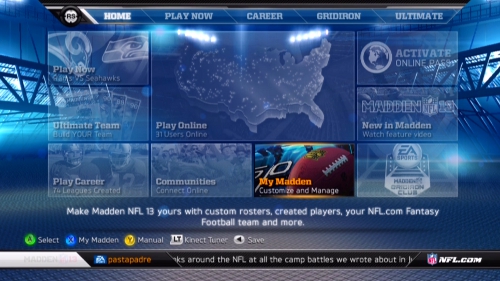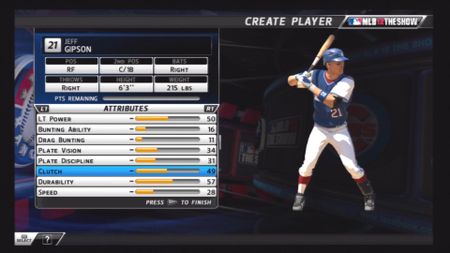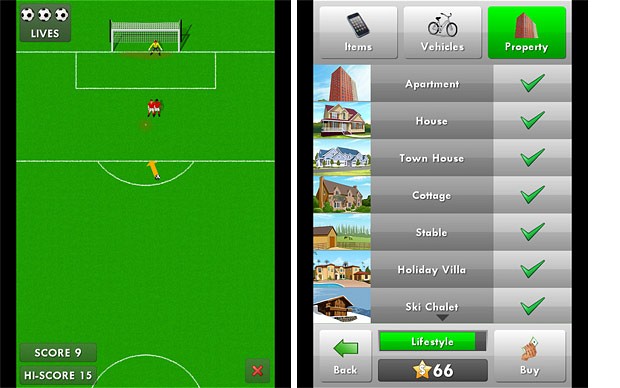Sports Videogames Are Too Long

Sports videogames are too long. Let me rephrase for the sake of specificity, sports videogames have too much.
I am a serial career mode player. I bought Madden NFL 13 when it was released, and in the seven months of owning the game, throughout the whole football season, all I played was the single-player career mode, and I did so multiple times. I logged significant hours in that game, and I only ever played that one mode.
 I do the same with MLB: The Show every year. I buy the game on release , and all I ever end up playing is the “Road to the Show” career mode. I know Kotaku’s Owen Good is the same way. Interestingly enough, I never get too far either. I’ve never made it past the 5th year of any career in any MLB: The Show game, though not for a lack of effort. Baseball seasons are long, even in videogame terms, and especially when I prefer not to simulate games.
I do the same with MLB: The Show every year. I buy the game on release , and all I ever end up playing is the “Road to the Show” career mode. I know Kotaku’s Owen Good is the same way. Interestingly enough, I never get too far either. I’ve never made it past the 5th year of any career in any MLB: The Show game, though not for a lack of effort. Baseball seasons are long, even in videogame terms, and especially when I prefer not to simulate games.
This perhaps says a bit about me and what my preferences are — I clearly enjoy the progression, the grind, and the role-playing elements of the mode. I also have an 18 month old son now, a thesis to finish, work obligations, and all that other media to consume, so it may be that I just don’t have the hundreds of hours it takes to play every mode in a game. We shell out $60 yearly to play only a portion of what is made available by a game. Perhaps this is simply a well thought out attempt to address many different subsections of a broader sports videogame playing market. Or maybe other people have much more time to invest in exploring the many different available options and features in a sports videogame. Maybe. I think that, more accurately, the size of modern AAA televisual sports videogames is less about design, and more likely subsequent to the institutional structures of the videogame industry. The breadth of options in these games is something that has been inherited from yearly iteration in each console era, and from expectations that have been set by other genres of videogames.
The alternative would be that consumers could pay, a la carte, for the modes they want. Naturally, publishers may not be inclined to do this as they are already getting my $60 to buy a game I only play part of. But while I am still incentivized to buy the game at full cost, there may be others, especially those who decry that sports videogames are merely yearly roster updates, who may be interested in paying for only the options that they think they want. Publishers may also find that consumers will spend more to buy other options after first trying one game mode, especially if the product is good.
While this is an interesting fantasy, I think we may still be pretty far away from just such a publication model, at least in the console game market. I think that there are simply too many pressures to keep sports videogames as fully featured as possible, even if those features are not all well designed or played by consumers. This is not a problem specific to sports videogames, however. In the networked console era, it is an expectation that games have some form of networked feature at least, and generally this means some kind of multiplayer experience. Games are negatively critiqued if they do not have multiplayer options, regardless of whether the feature is any good. Narrative games are expected to have hours upon hours of gameplay, and are criticized for being short if they don’t. Almost every game reviewing website has a category called “features” which can be easily read to mean a measure of quantity not necessarily quality, and in this metacritic obsessed age of game publication, “features” matteer a lot.
It is also likely that we’ve reached a moment where sports videogames, because they are iterated on yearly, often build upon the basis of an earlier game, designing through addition more than subtraction. It is uncommon for a game to be completely rebuilt, especially since the schedule for publication is especially short. Fans have grown to expect that every other year a major sports title might show some large scale innovation, as that team had two years to work on it rather than just the one for the release in between. This design by addition has created sports titles with some tremendous feature bloat, and yet we celebrate this overdesign. I don’t know, maybe this has something to do with a larger American cultural celebration of excess — you know, more is better.
There is some hope, however. One of my favorite sports titles recently was the flash and iOS game New Star Soccer. It is basically all the elements of a sports career mode, with a simple touch screen mechanic used in games to earn the in-game currency for leveling up. I played New Star Soccer on the iPhone, and this meant that I could play in spurts — on the train, on the commode, with a few minutes to kill. My progress was tracked and I relished my advancement as a soccer player starting in the lower levels of the Dutch Eredevisise and moving up to the English Premier League. I even got to play for the Dutch national team in both the World Cup and the Euro.
It may be that the changing platforms and distribution models in videogames will open the door for more of these types of sports videogame experiences. As more and more players of all kinds are flocking to mobil platforms for videogames, I suspect that publishers of sports games will begin their migration there too. The last version of FIFA for the iOS was excellent, though it too still had many features, just at a lower price point. I am still waiting anxiously for a version of “Road to the Show” to play on my iPhone. Maybe I’ll need to make it myself.

